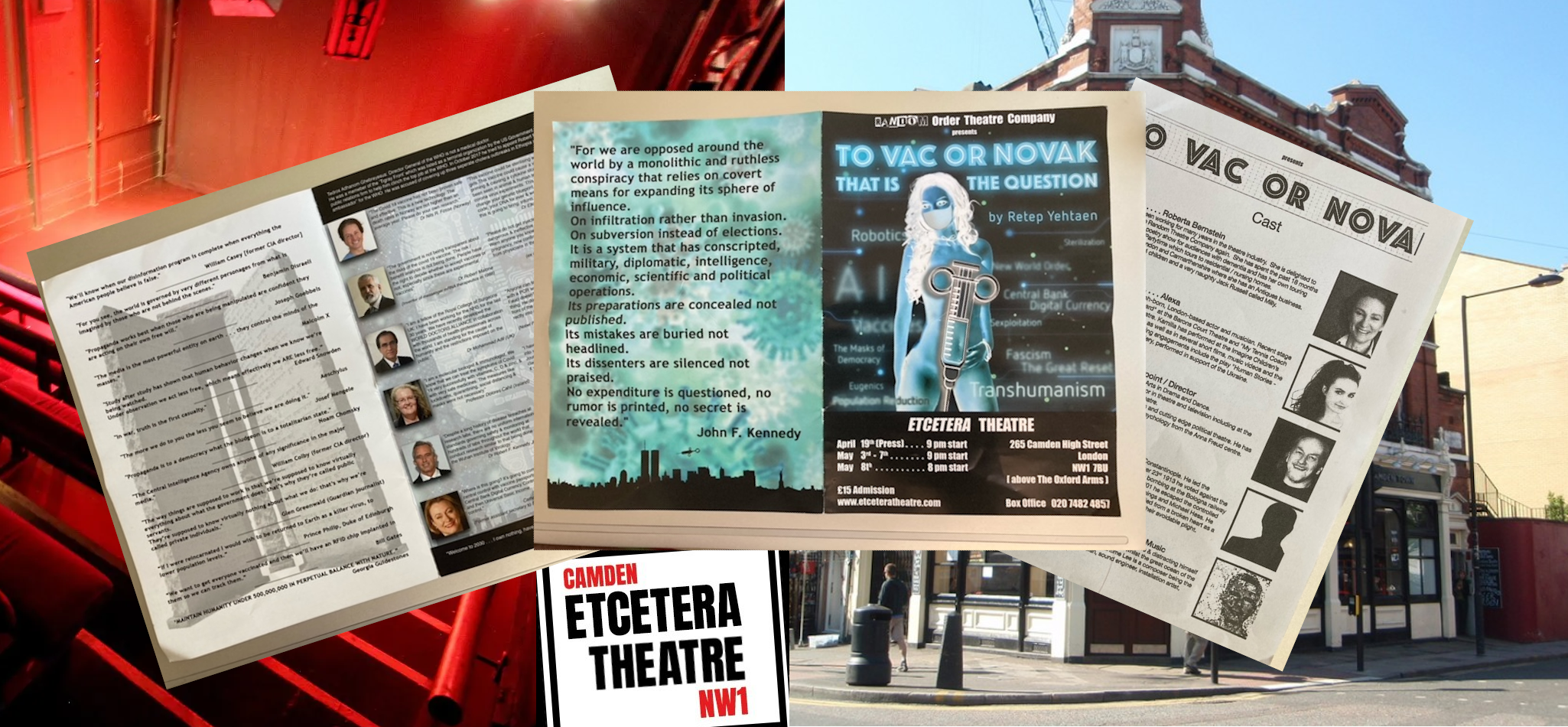REVIEW: To Vac or Novak That is The Question

Joanna Sharp
So what do we do on a weekend evening of the New Normal? ‘To Vac or Novak. That is the Question.’
The exhausting two years under the regime of ‘science-led’ lockdowns and other ‘health’ measures officially aimed at containing the spread, or even more ambitiously, eradicating Covid 19 (which by the standards of mainstream virology is not actually possible) has proved a physical and spiritual assault on humanity.
Here, in the UK we have now been allowed to stop wearing masks, are no longer told to test wherever we go – and the vax pressure seems to have eased.
Most on this side of the Covid propaganda divide realise this a lull before another storm. Still, it is Spring, the freedom might not last, so we must live it to the full before the next instalment of the not-so-great technocratic reset. The sun is shining, and people are out again, enjoying life in busy streets and parks of London.
But the last two years have left some deep wounds; things are not, of course, back to normal. Many doctors’ surgeries are still closed and might never re-open as the covert NHS sell out continues, and what happens to all those who desperately need help is hard to see.
Then there is the untold economic, psychological, and indeed medical misery brought to so many, through lockdowns. People have lost touch with each other, and there is a palpable deepening of the social impacts of globalised capitalism: growing poverty, fragmented communities, atomisation, loneliness, and isolation. An acceleration of that brutal process observed first by Karl Marx that in capitalism ‘All that is solid melts into air’, more recently described by the eminent sociologist Zygmunt Bauman as ‘liquid modernity’ in which everything, including social bonds such as love, are in constant process of dissolving and flux.
Many of us who have not fallen for the Big Lies on the so-called pandemic have found ourselves socially homeless and estranged from so much that was close and familiar before the crisis: our family members, friends, colleagues, neighbours, but also from a sense of belonging in our towns and cities.
Whilst those who do not question the official narratives are beginning to put the last two years behind them, we, living in a parallel reality, are bracing ourselves for uncertainty of a different magnitude.
It is a strange feeling seeing the joy of Spring energy but looking at it as one looks at children playing. It’s good they are playing; they don’t know what awaits them in the not-so-distant future.
So when early last week, I heard the plug from Britain’s most popular independent media channel UKColumn for a play on the topic of vaccines, I rushed to get the tickets for ‘To Vac or Novak That is The Question’ (What a great title!) by the Random Order Theatre Company and directed by Peter Neathey.
The booking process itself proved a slightly unsettling experience of the new normal. The online purchase generated tickets being sent into the Orwellian sounding ‘Citizen Wallet’ which then requires the ‘Citizen Ticket app’ with a virtuous sustainability agenda message informing me that by buying the ticket I ‘have helped plant 1611 trees!’
Wow, that deserves a Facebook post, no?
Having managed to avoid downloading any new apps, I was pleasantly surprised, upon arrival at the theatre, when the apologetic staff member produced a good old fashioned handwritten list of ticket holders. There is nothing so reassuring at this historical juncture than finding yourself out of mobile signal reach or when failing computer systems get replaced by traditional pen and paper.
Written by Retep Yehten, the play was staged at Etcetera Theatre, a cosy fringe venue above The Oxford Arms pub in vibrant Camden, London. The audience was allowed in exactly 15 minutes before the scheduled start and treated to a series of video clips featuring familiar Covid 19 resistance material including Robert F Kennedy Jr, Dr Vernon Coleman, UK Column, Debbie Evans and many others, as well as various memes and … intriguingly explicit advertisements for what could be real or artificial exceptionally well-endowed ‘girls’.
For any ‘normies’ in the audience that preliminary dose of ‘truther’ clips would have challenged their ideas about the pandemic and, potentially, their notion of conspiracy theories, and set the scene for the story by citing some authoritative science-based material never aired on mainstream media.
For the Covid sceptic – like myself – seeing a selection of faces and voices I’ve got to know so well over the last two years, shown on a big screen in a public space of a theatre together with other members of the audience, was a validation of my sanity and perception; an experience of reassurance, which is difficult to describe.
The small theatre was practically full, and people kept coming as the play began.
The story is set in the home of a middle-aged couple. Roberta Bernstein (Fiona Evans) is a Covid sceptic and is spending much of her time researching the pandemic narrative inconsistencies and trying to communicate her concerns to her partner, Justyn Mypoint (Peter Neathey). Justyn is passionate about sport, particularly tennis and, as a responsible and nice middle-class ‘normie’, does what is required of him: follows ‘the science’, wears a mask, even when driving alone in the car, gets the jab and all the boosters and is happy to shift his tennis coaching work online in lockdown.
Justyn finds Roberta’s attempts to share Covid sceptic links and sources increasingly irritating and intolerable and calls her a tin- foil hat wearer conspiracy theorist. Not matter how factual and persuasive the material she shows him, be it Novak Djokovic’s own explanation why he decided against getting the vaccine, a compilation of countless sportspeople collapsing with heart problems live on TV or UK government’s own MHRA statistics on Covid 19 vaccine adverse reactions and deaths, he dismisses everything she is trying to show him as fake news, as conspiracy theory, as nonsense.
Unsurprisingly, their relationship is increasingly strained, and Justyn frequently voices his frustration with Roberta’s preference for sleeping in the spare bedroom.
Whilst getting to grips with the online tennis coaching technology, Justyn gets intrigued and seduced by the advertised ’extras’ (or possibly the actual offer) provided by the tennis coaching website: a life-size attractive East European dominatrix-sounding AI, Alexa (Kamila Gregorovitch) available for purchase or hire.
When Roberta announces a trip to her mother for a couple of days, Justyn wastes no time and hires Alexa, at a shocking price.
When Alexa is delivered and activated by a remote control, events take an unexpected turn. Alexa’s services come in different ‘levels’ and programmes but Justyn settles for level 1 – traditional and male ego-boosting, one could say. After (rather hilarious and…robotic) sex with Alexa, Justyn gets a phone call and learns that Roberta is coming home early. He rushes to hide the robot and the evidence of his infidelity just as Roberta appears at the door.
Inevitably, Roberta accidently activates the robot with the remote control she sat on and the final drama with its twists unfolds.
Like the actual Amazon artificial intelligence (AI) service called Alexa, linked to a vast cloud computing infrastructure and, allegedly, surveillance, this Alexa also turns out to have dual function: whilst being a (very) ‘personal assistant’ with adaptable and bespoke functionality, she is also a tool of surveillance, control and ultimately, repression by the system.
At this comical dramatic climax, Yehtean brings us back to our real core and terrifying concerns with what the Covid 19 event has heralded (signalled) for the world: the launching of the global power infrastructure bringing, through the medical emergency powers, technocratic totalitarianism with its CBDC and ultimately transhumanism into the realm of possibility and likelihood.
What this play is ultimately about are the personal costs and losses of living red-pilled, carrying a burden of terrifying knowledge in a naïve, propagandised and increasingly hostile world, being dismissed, ridiculed, and pushed away by loved ones and society at large.
It is a profound sense of being marginalised without any official or mainstream recognition; not from traditional left wing defenders of the excluded, not even from a veteran expert on western propaganda and power such as Noam Chomsky who in the summer of 2021 shocked many by suggesting that those refusing to take Covid 19 vaccines should isolate themselves from society and bear the consequences even if that meant not being able to make a living.
Unsurprisingly, Roberta’s mental health is already affected as she suffers nightmares. Roberta and Justyn’s relationship is falling apart as are many marriages out there today over the issue of Covid 19.
I personally know of two families in which one partner desperately tried and failed to stop the spouse and children from taking the jab. Equally, many of us have lost friendships or at least the meaningful connection and support from them.
Within the resistance groups much focus, understandably, has been directed at various practical solutions advocated by the leading voices, such as James Corbett, Catherine Austin Fitts and Ice Age Farmer, on building new independent economic, food security, financial, healthcare and educational structures. But our alternative world needs more than new independent structures and ways of doing things.
We also need to belong.
We need our stories to be told and we need to make sense of our experiences collectively through music, art, literature, and theatre.
Theatre, that physical space where one is immersed in an unfolding human drama enacted by real flesh and blood actors right there and then, and where one is surrounded by other people experiencing the same events in real time – is a place where the magic of meaning making and community building takes place.
‘To Vac or Novak That is the Question’ tells one of our (if not the) key current stories, one which is known to every single person on this side of the Covid 19 propaganda divide.
This is the tale that makes us a community, which Zygmunt Bauman, in his book Community, described as being based on common understanding and shared by all its members “so that we understand each other ‘without words’ and never need to ask, apprehensively, ‘what do you mean?’”.
The story has been written by Retep Yehtaen and performed compellingly, with seriousness and humour by the cast but is known well (minus the Alexa experience) by most if not all those in the resistance.
I hope Random Order Theatre will tour this play so more people have time to take their ‘normie’ friends to see it. It is a very well-produced and enjoyable piece of theatre in its own right but it also a powerful form of resistance activism which can re-open those important conversations about the Covid 19 episode just as most people are beginning to put it behind them and are ready to believe the next thing.
The play programme doubles as a resistance leaflet with over a dozen quotes from now prominent figures fighting the Covid 19 lies.
I am definitely keeping mine as a souvenir and look forward to the next play by Retep Yehtaen who wrote, directed and financed this important work, his fifth production at Camden’s Etcetera venue.


